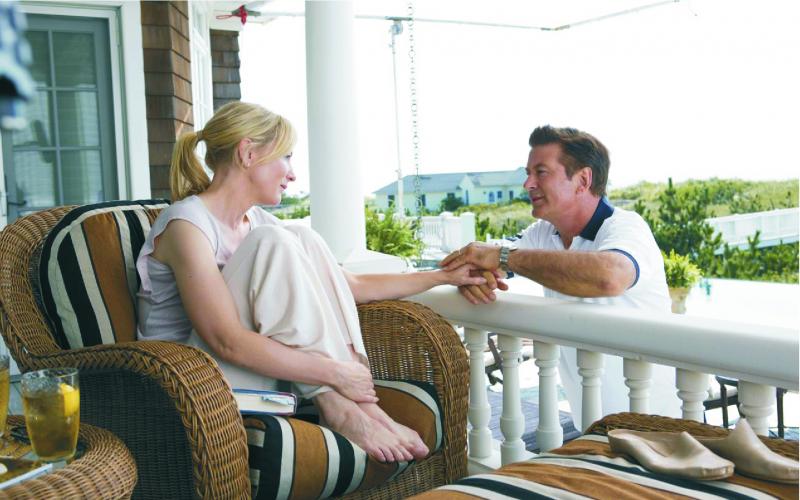‘Blue Jasmine’ is Woody Allen at his best
“Blue Jasmine,” opened at the Harbor Theatre in Boothbay Harbor last weekend and continues through Sunday, Sept. 15, at 7 p.m., with a 3 p.m. Sunday matinee. It plays at the Lincoln Theater in Damariscotta September 27-29 and October 2, with shows at 2 p.m. and 7 p.m., and one 2 p.m. show on October 3.
Woody Allen's new film, “Blue Jasmine,” is the story of one woman's frailty of mind and her descent into emotional and mental oblivion.
The film's jazz soundtrack (classic Allen) almost takes a back seat to the recurring tune “Blue Moon.”
Relationships, deception, duplicity, the love of wealth and the luxuries it affords, are all explored through Allen's brilliant script and perfect casting by Juliet Taylor and Allen. If you've heard this is one of Allen's best — believe it.
The intensity of the characters, their situations and the equally raw and fragile emotions of this film reminded me of Allen's “Interiors,” from 1978.
A longtime fan, I can still remember how “Interiors” led to much conversation afterward with the people I had gone to see it with. It was a compelling story of a family in crisis — not the family in general, but each character within it.
I also recall the film didn't do so well at the theaters, but I have always loved films, books and plays with some darkness to them. But back to “Blue Jasmine.”
Cate Blanchett stars in the title role of Jasmine French. When we meet her she is a former New York socialite who is rambling, stream-of-consciousness-like, to herself and a woman seated next to her on an airplane.
To French, her life as the wife of Wall Street financier Hal French, portrayed by Alec Baldwin, with all its fineries (clothes, jewels, homes, parties, vacations) seems like a dream; except for the memories that engulf her mind.
They are intense memories to which she reacts to aloud, as though the scenes, people, suspicions and hurt were being experienced in present tense. And they are, because Jasmine is losing touch with reality, even though she has just been released from a treatment center after suffering a nervous breakdown.
“Anxiety, nightmares and a nervous breakdown, there’s only so many traumas a person can withstand until they take to the streets and start screaming,” says Jasmine.
Indeed.
Hal had been a womanizer for the entirety of their marriage, a fact all of their friends and aquaintances are well aware of. For many years Jasmine's blinders protected her from this reality, until she could no longer suppress her suspicions about her husband's infidelity. Additionally, Hal is quite the money-maker, involved in innumerable real estate deals. Does she suspect his transactions are not entirely legal? No. She tells her friends she never pays attention to Hal's dealings.
As one of her friends says, “When Jasmine doesn't want to know something, she looks the other way.”
Those dealings include defrauding investors, including Jasmine's former brother-in-law, Augie, years earlier, which eventually plays a role in his being arrested, convicted and jailed.
Jasmine finds herself in need of her sister Ginger's help. Ginger, played by Sally Hawkins, has agreed to let her formerly rich sister stay with her for awhile, just until she gets her bearings.
Ginger's current boyfriend, Chili (Bobby Cannavale), is against it. Try vehemently against it. Where, he argues, was Jasmine when Ginger needed help? When Ginger and Augie (Andrew Dice Clay) lost their lottery winnings to get in on one of Hal's real estate deals, did they ever offer to help them financially?
Jasmine's memories of who she used to be are triggered by a phrase, a scent ....
French perfume recalls Hal's admission of love for a French au pair; a song, “Blue Moon,” heard somewhere, “their song.”
As we journey with Jasmine as she travels back in time through flashbacks, we see her frailty subtly increase as Jasmine, the living, breathing human fades out, like the Disney “Alice in Wonderland's” Cheshire Cat.
As she relives her previous life in memory flashbacks, she relives the loss of love, financial security and comfort; in others she experiences guilt and shame for action or inaction.
She attempted to work before heading out to her sister in San Francisco, but could not bear the thought of waiting on her former socialite friends.
Her only escape from her new reality is shots of Stoli vodka and her Xanax prescription. Until she meets a wealthy ambassador with political aspirations.
Jasmine passes herself off as an interior designer when they meet at a party. He hires her to do his new home. On all fronts it appears Jasmine will be saved, until the couple run into Augie, while out shopping for an engagement ring. During this encounter her hope is crushed by Augie's recounting of the past, an earful for her new man.
The film's ending will stay with you. No longer capable of screaming in the street, Jasmine ends up at a bus stop where another woman is sitting — until she begins to ramble. As she falls those final few feet into oblivion, “Blue Moon” is playing somewhere in her head. She says aloud, “‘Blue Moon’ … you know the song … I used to know it, but the words are all a-jumble now ....”
Blanchett's standout performance alone makes this Woody Allen film one everyone should see. This role should earn her an Academy Award nomination.
In a recent interview with the BBC, Allen said that as he wrote the script, he thought Cate Blanchett would be perfect in the role, but would she would actually be available? Luckily for Allen, and audiences, she was.
Event Date
Address
United States


























